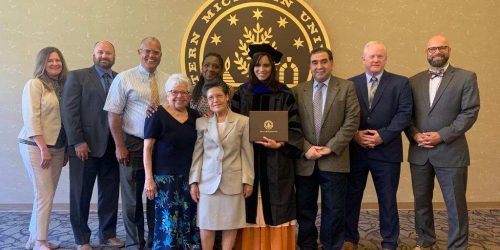
Western Michigan University administrators present Lusanni Acosta with diploma at special graduation ceremony. (L-R) Dr. Christopher Cheatham, interim provost, and vp for academic affairs; Dr. Edward Montgomery, president; Dr. Diane Anderson, vp for Student Affairs; Dr. Lusanni Acosta; Jeremy Hall, superintendent, Michigan Conference; Jorge Rodriguez, professor; Steven Butt, dean, College of Engineering and Applied Sciences.
While growing up in the Caribbean, Lusanni Acosta had no idea of the miracles God would work in her life for His sake.
Early on, she knew she wanted to be an engineer. “I found all those things—algebra, geometry, calculus—easy,” she said. She decided to study civil engineering for her undergraduate degree. She received significant financial assistance and scholarships that paid the entire cost of her undergraduate program.
What awaited her, she says, was worth waiting for.
After high school, Acosta decided to attend Western Michigan University (WMU) in Kalamazoo. When she arrived at the university, something unexpected happened. Acosta had to sign paperwork regarding her scholarships—but the only time she could sign was on Sabbath.
“I decided, ‘No, I will not bow to this graven image,’” she says. Acosta decided to discuss the issue with the program director. “He told me that they understood, and that they’d be willing to accommodate me.” This wouldn’t be the first time her faith was tested.
Before Acosta started her courses, she had to take an exam. Again, she encountered a Sabbath challenge. This time it was not just paperwork—it was an exam, and the entirety of her financial aid depended on her completing it.
The director told her that she would only be allowed to complete the exam on Sabbath. “I told the director, ‘I’m sorry, but I can’t take it,’” she says. She was 18 years old and prepared to walk away from her scholarships. “I was convicted, but I was still thinking, ‘Lord, I don’t know about this, but I am believing right now.’” The next morning at 2 a.m. she received an email from the director that she describes as a miracle. “It said, ‘Lusanni, there is an alternative day.’” She was able to take the exam, and receive her financial assistance.
At several points, Acosta had key exams scheduled on Sabbath, overflowing homework, and other challenges. But, she felt that these challenges were a way of witnessing to her friends on campus. “My friends would come to me later and say, ‘You’re getting an education, but you’re also doing ‘the God thing.’ So, what if we have a PhD? You’re already doing something powerful.’”
Because she stood up for what she believed, she reached her friends in ways that traditional evangelism couldn’t.
As Acosta prepared to complete her Doctor of Philosophy in Civil Engineering, she learned that WMU’s graduation would be held on Sabbath. Once again, she knew she had to do what was right. “People came to me and said, ‘You’re not going to go? Lusanni, you have to go to your graduation. Isn’t a PhD high enough? Can you get a waiver from the Lord or something?’ and I told them, ‘No, God is higher than this.’”
When she completed her undergraduate and graduate degrees, both graduations were held on Sabbath. On both occasions, she was able to participate in a photo-op with the university’s president in place of the traditional graduation ceremony. But this time, she discovered something even more worthwhile was in store.
Upon hearing about Acosta’s beliefs, and her determination to do what she knew to be right, WMU administrators held a special graduation ceremony—just for her. “It was so amazing,” she says. “I walked down the aisle and shook everybody’s hand. It was just like the ceremony that they had on Sabbath—but only for me. It’s something I’ll never forget.”
Jeremy Hall, superintendent of Schools for the Michigan Conference, attended the ceremony and said it was an inspiring moment to witness. “It was encouraging to see the faith of this student who viewed her loyalty to God as more sought after and valued than marching with her classmates to receive her degree in the official ceremony," he says. "It’s encouraging to see that there are still young people who view the citizenship of heaven as of greater value than the pursuits of this world.”